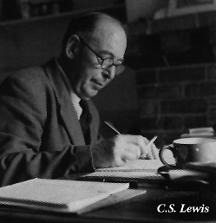Eight Rules for Good Writing from C. S. Lewis on His 107th Birthday
11/29/2005 01:59 Filed in: Miscellaneous

1. Turn off the radio [and television].
2. Read good books and avoid most magazines.
3. Write with the ear, not the eye. Make every sentence sound good.
4. Write only about things that interest you. If you have no interests, you won't ever be a writer.
5. Be clear. Remember that readers can't know your mind. Don't forget to tell them exactly what they need to know to understand you.
6. Save odds and ends of writing attempts, because you may be able to use them later.
7. You need a well-trained sense of word-rhythm, and the noise of a typewriter will interfere.
8. Know the meaning of every word you use.
Source: C. S. Lewis. Collected Letters. New York: Harcourt, Brace and World, 1966, 291-292. Quoted in Kathryn Lindskoog, Creative Writing for People Who Can't Not Write. Grand Rapids, Michigan: Zondervan Publishing House, 1989, 253.
By the way, I would only take issue with the second half of #7. C. S. Lewis was an advocate of writing manuscripts out by longhand before ever typing them on a typewriter. For those of you who even remember typewriters (!), Lewis isn't talking about the IBM Selectrics like I used in my 10th grade typing class in 1983. Rather he is referring to the old manual typewriters that moved a lever that struck the page when you pressed a key and thus created a rhythm of its own that would be distracting from the rhythm of the words you want to write as Lewis describes.
In my opinion, most modern computer keyboards are so quiet that it's acceptable to write in front of the screen. However, to her credit, Kathy still writes everything out by longhand first (on yellow legal pads) and then transcribes and edits on the computer.
Lewis was born on this day in 1898. Too bad we can't send him a birthday card. Do the next best thing and send Perry Bramlett, founder of C. S. Lewis for the Local Church an email wishing him a "Happy C. S. Lewis Day."









